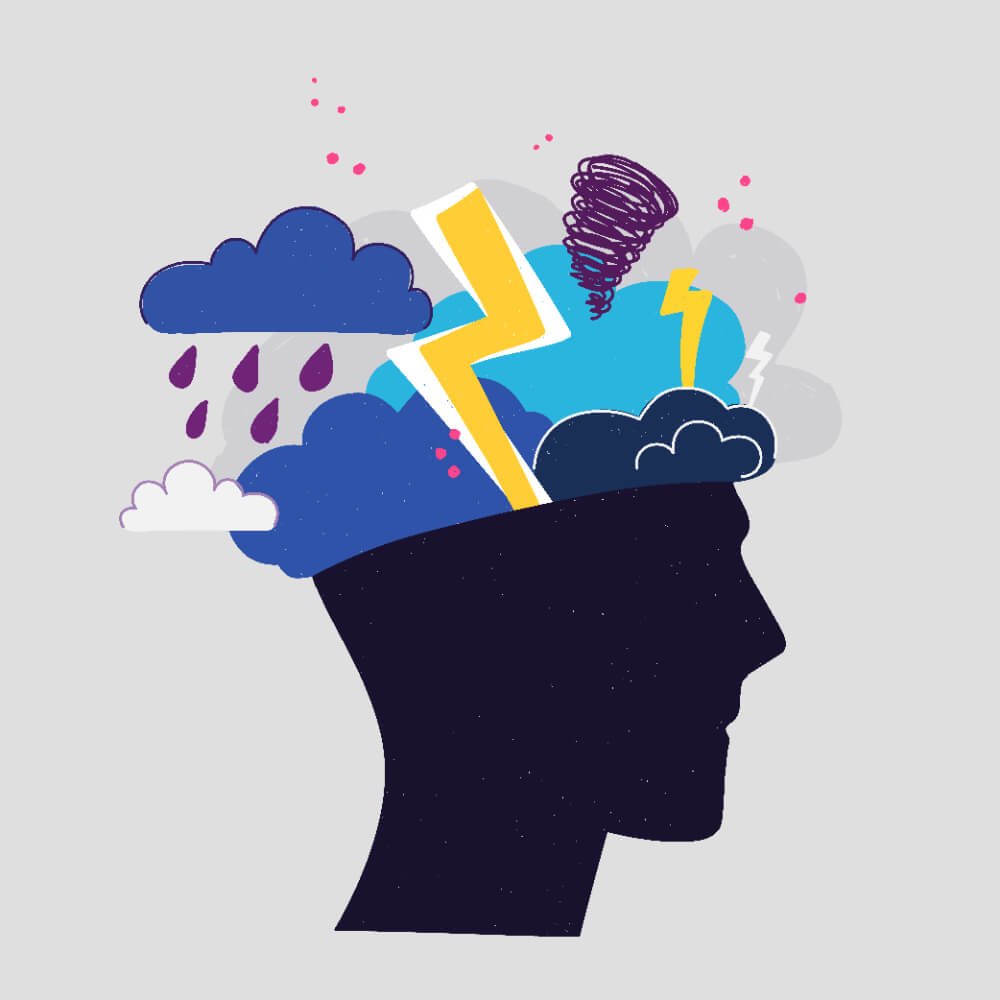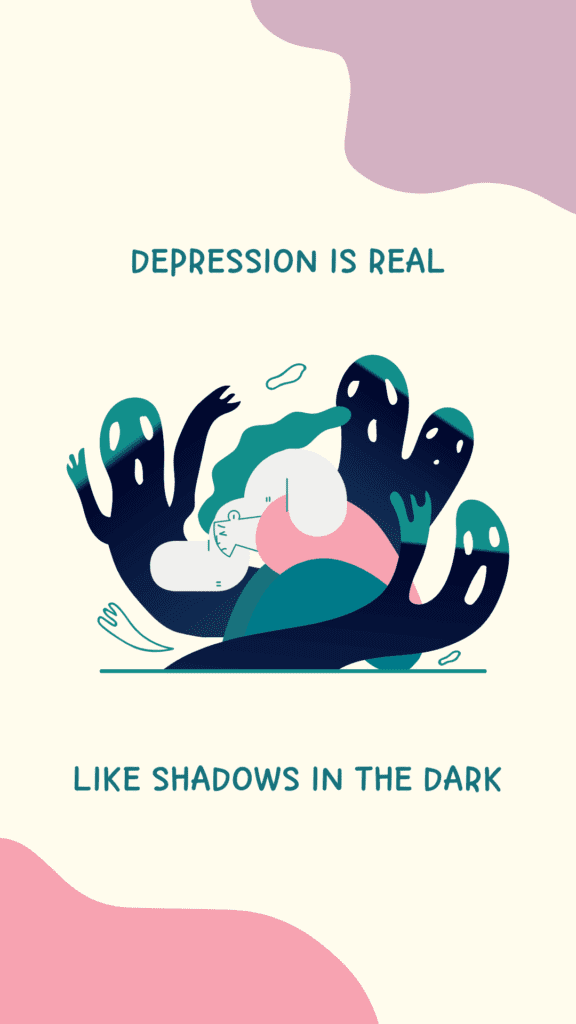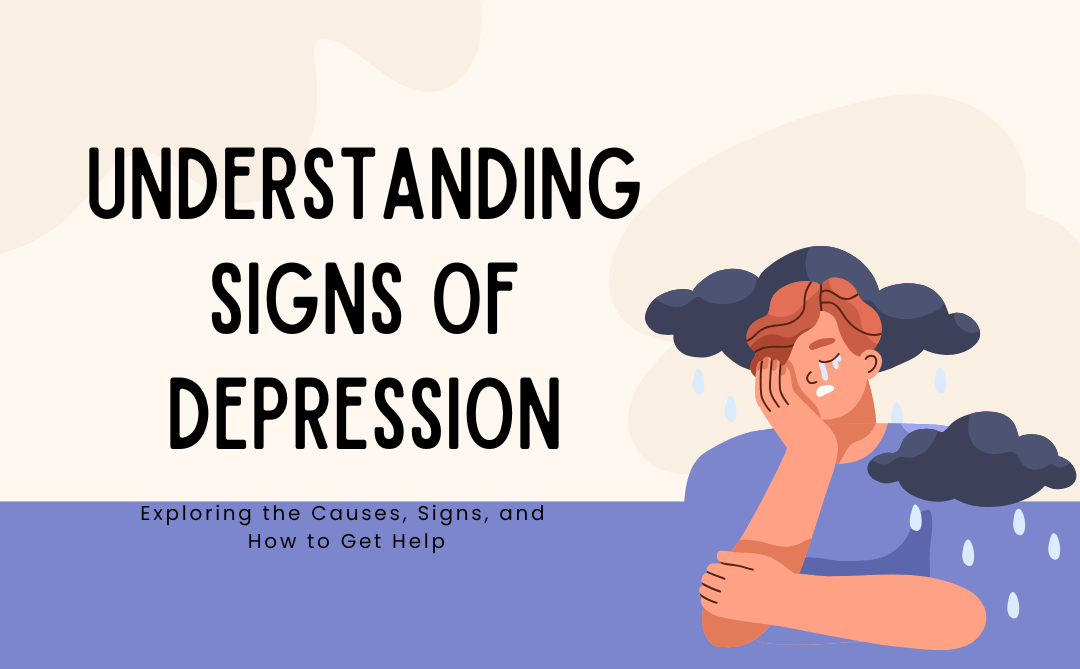Signs of Depression remains one of the most severely unacknowledged ailments, affecting millions globally on a daily basis. The most important step is to recognize possible symptoms as this will allow for better mental health.
Table of Contents
Here are a few warning signs of depression:
1. Persistent Feeling of Sadness: Multiple weeks of feeling hopeless may be a symptom signs of depression.
2. Apathy: Losing interest within hobbies is a major signs of depression.
3. Insomnia or Abnormal Sleeping Patterns: Distress can take form through insomnia, or sleeping too much.
4. Constant Fatigue: Feeling tired all day, regardless of activity, is a concerning sign.
5. Inability to Focus: Often one of the leading signs of depression is difficulty concentrating.
6. Depression related/Somatoform Symptoms: Unusual headaches or stomach issues or any other kind of pain may also be signs of depression.
What Now: Many of the symptoms stated above can be difficult to process so seeking help from a loved one or a psychologist is the best action. It is important to intervene as early as possible.
Depression Causing Physical Symptoms: Hidden Signs of Depression
While depression is often classified as an emotional ailment, it can pose dire physical effects as well. Identifying these signs is essential for proper treatment:
1. Aching Without Cause: Long lasting headaches, migraines, or muscle pains may arise without any reason.
2. Digestive Issues: Ailments like nausea or bloating may stem from mental health.
3. Fatigue: A feeling of sluggishness can occur despite having many hours of sleep.
4. Changes in Appetite: Binge eating or no eating at all can cause a person to gain and lose weight.
5. Sleep Problems: Not able to sleep or sleeping too much.
6. Immunity Reduction: A weak immune system which results in a person getting sick very often.
Importance: If left unattended, these symptoms can exacerbate depression. Explain these ailments to a doctor when sought out.

Different Signs of Depression and Their Management
There are distinct forms of depression. Classification of its types assists in determining the appropriate remedy:
1. Major Depressive Disorder, (MDD): A melancholic state that persists for a good deal of time, coupled with lethargy and lack of interest in life. Undergo therapy, and get medication as well as change lifestyle patterns.
2. Persistent Depressive Disorder (PDD): Symptoms that are less strong but continue to exist strongly. Adopt positive habits and create schedules that include mindfulness.
3. Winter Depression (SAD): Depression characterized with winter season. Employ light therapy and remain active.
4. Postpartum Depression – PPD: This disorder is common among new mothers. Attend support groups and focus on self care.
5. Bipolar Disorder (Manic-depressive illness): Individual experiences major mood shifts that are overly exaggerated. Intensive engagement with a mental health specialist is a must.
Self-Care Tips: It is advisable to talk to someone, call someone for help, go to sleep at a reasonable hour, work out, and eat healthy.
Signs of Depression in Woman and Man
Signs and symptoms of depression differ between male and female pairs:
Women:
- Always feels gloomy and few things bring happiness, and suffers from excessive guilt.
- Withdrawal from previously enjoyed past times.
- Getting tired, trouble sleeping, and changing eating habits.
Men:
- Behavioral changes, irritability, and aggression.
- Substance abuse or other risky activities.
- Headaches or gastrointestinal trouble.
Significance: With the right support at the right time, these differences can be dealt with.
A Parent’s Handbook To Spot Depression In Their Teenage Children
Teenage depression is one that is often not noticed at all. Some noticeable symptoms include:
- Constant feeling of sadness or irritability.
- Lack of interest in any kind of hobbies.
- Exhaustion along with a disrupted sleep cycle.
- Headaches and general fatigue.
- Isolation from family and friends.
What Parents Can Do: Help by encouraging active conversations. Give support when needed, and reach out to someone professional to help.
Depressed? Stressed? Or Just Sad? Getting the Facts Straight
Though stress, sadness, and depression can be similar in nature to the untrained eye, they greatly vary when looking at their duration and severity.
Sadness:
- Events with specific triggers can lead to sadness.
- This feeling is temporary, and highly manageable.
Stress:
- External factors bring about stress.
- This can range from long-term to short, (chronic).
Depression:
- This is a more persistent form of sadness where one feels hopeless and loses interest in everything.
- Even everyday tasks become difficult, and mental support is often very useful.
Dealing With Each:
- Support and help from close ones are enough to manage sadness.
- Stress can be dealt with by practicing relaxation.
- Professional help such as therapy and medication is the best tool to deal with depression.

Changes In Behavior As A Signs Of Early Depression
Signs of depression can manifest as behavioral changes such as:
- Social life withdrawal.
- Performance at school or work gets worsened.
- Greater anger and irritation outbursts have been noted.
- Increased disinterest in hobbies.
- Taking care of personal hygiene gets neglected.
- Changes in diet and sleeping patterns.
- Increased use of drugs and substances.
- Difficulty in focusing or decision making.
How to Help: Talk to them with love and care and help them get help from a specialist.
Overlapping Symptoms: How to Differentiate Between Anxiety and Depression
Even though anxiety and depression have overlapping symptoms, they differ when it comes to focus and energy:
Anxiety:
- Anxiety of the future and restlessness.
- Physical conditions such as rapid heart rate.
Depression:
- Dullness, persistent sadness, and loss of hope.
- Disinterest and fatigue.
Key Differences:
- Anxiety: Worrying, fear, restlessness.
- Depression: Dullness, persistent sadness, and increased fatigue.
Seeking Help: With the provision of medication and therapy, these conditions are easily treatable. Early intervention is necessary.
How to Cure Depression: Treating the Early and Late Stages
The condition of depression can be treated on any stage:
Early Stages:
1. Find a reliable person to get help from.
2. Get in touch with relevant specialists (therapy, medication).
3. Self care (change in exercise, diet, routine).
4. Set small plans that are easy to meet.
5. Use mindfulness to lower stress.
Late Stages:
1. Start intensive therapy (CBT, DBT).
2. Control the medication provided.
3. Join communities that offer support.
4. Establish rituals that incorporate self-care as a priority.
5. Get help from professionals and consider going to a rehab clinic if required.
Long-Term Recovery: Therapy, stress management, and physical exercises.
Final Remarks
Depression is a serious illness, but can also be targeted. Implementing preventative strategies as well as understanding the initial signs – affective, somatic and even behavioral – can be beneficial for timely intervention. It’s also important to know the difference between depression, sadness, and stress and how these self-reproaches alter with gender and teenage years to enable appropriate assistance.
Through due diligence, depression can be tackled, be it in its infantile or mature stages. The triad of therapy, medication, self-care, and well-wishers’ support systems are effective. There is no shame in looking for assistance and resources with proper determination will bring one closer to healing.
If you or a friend exhibit the aforementioned signs, do not wait any longer and seek help. Mental health is essential and taking the first step is always the hardest. You are not alone in this, and there will always be someone there to extend a helping hand.

